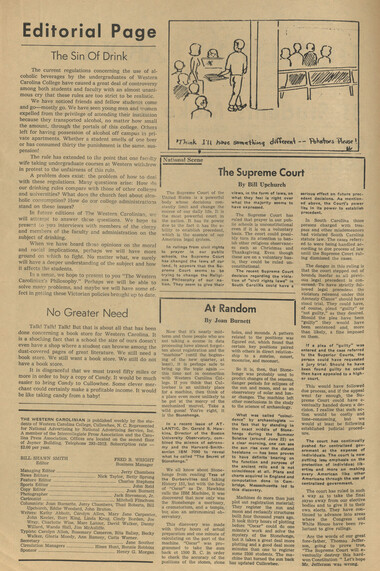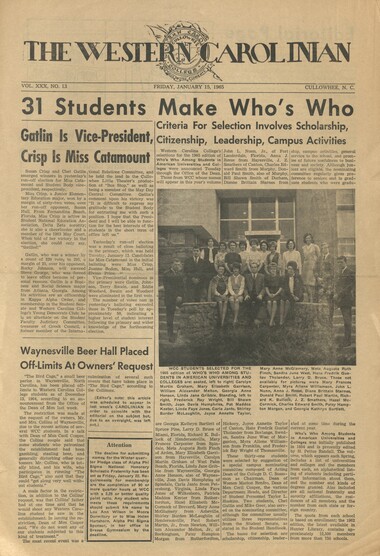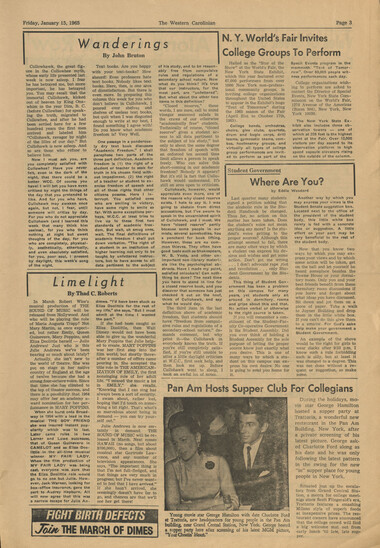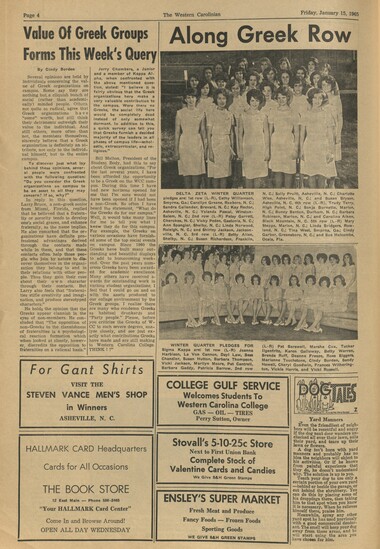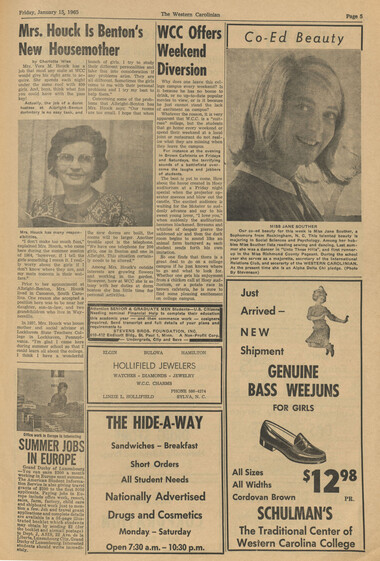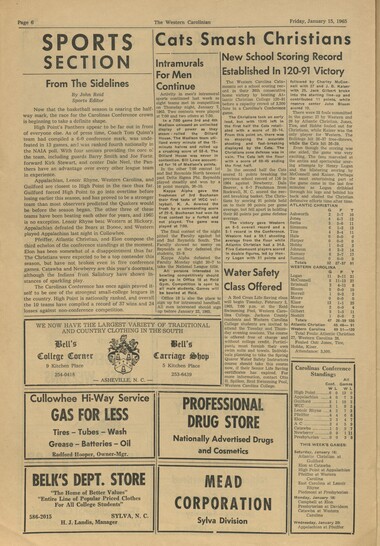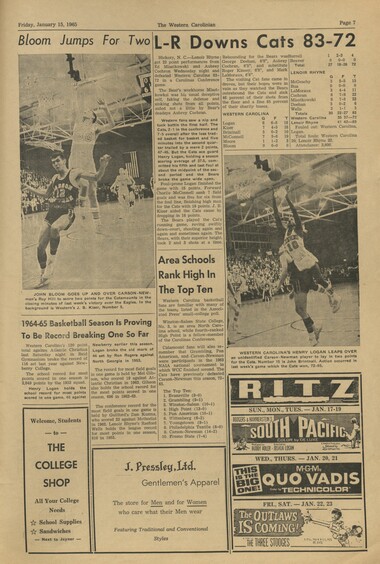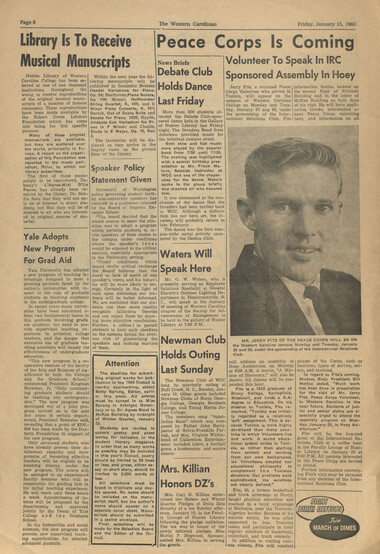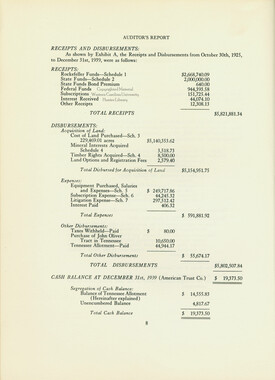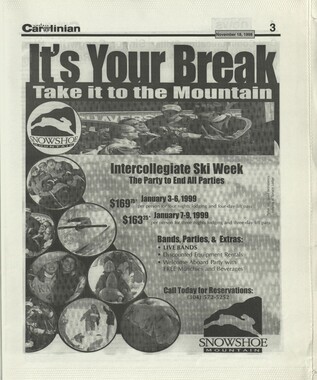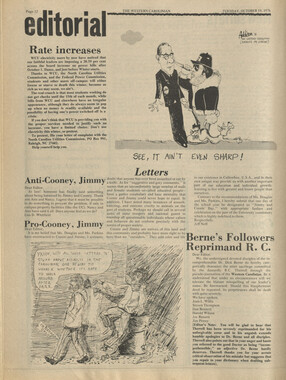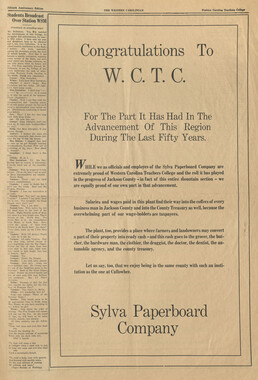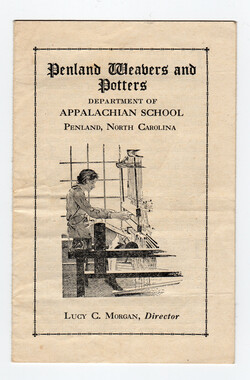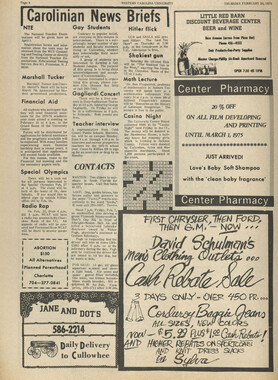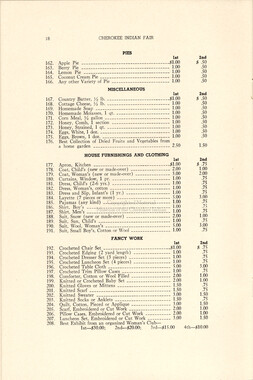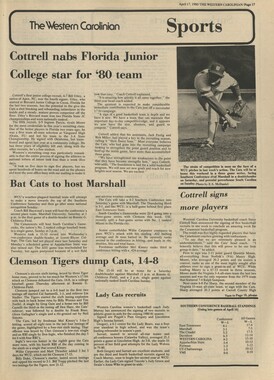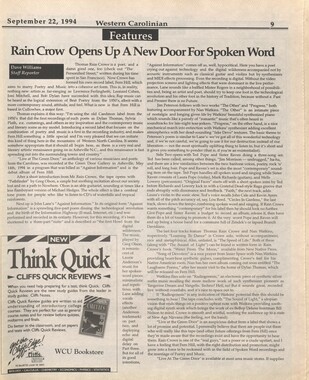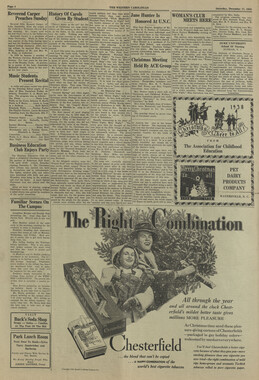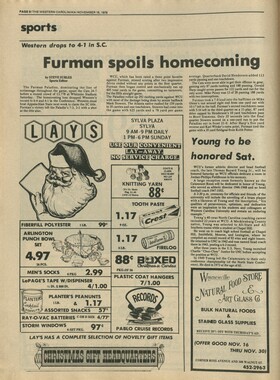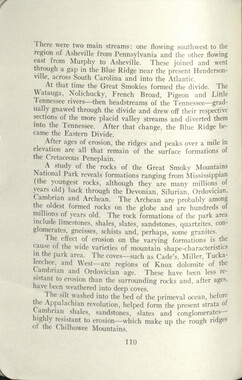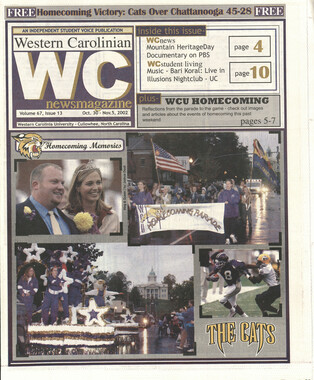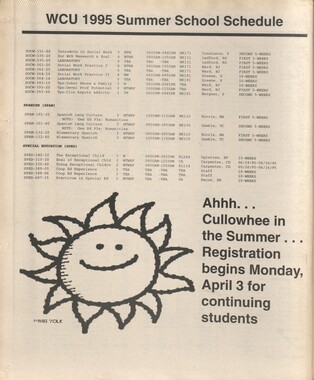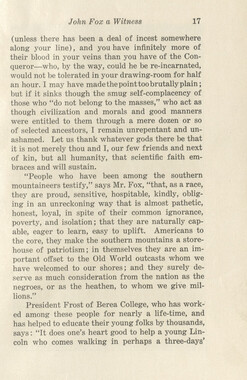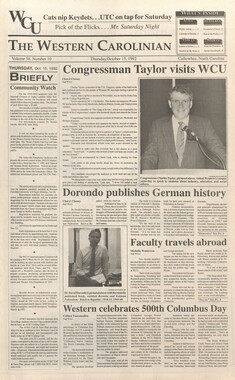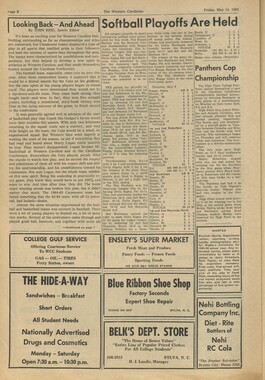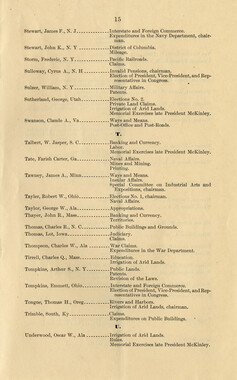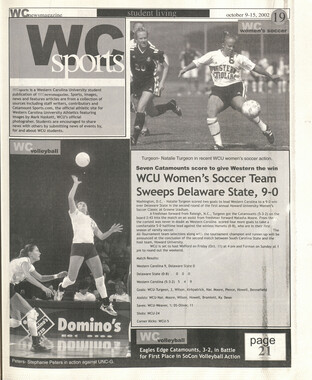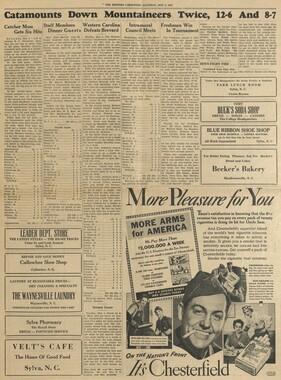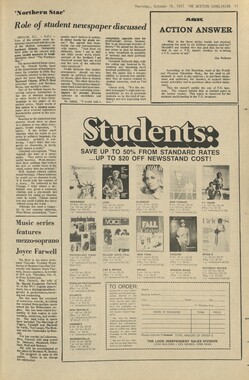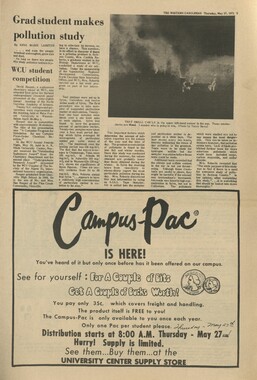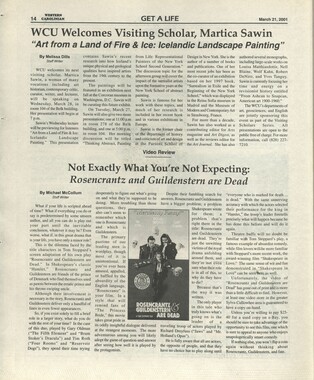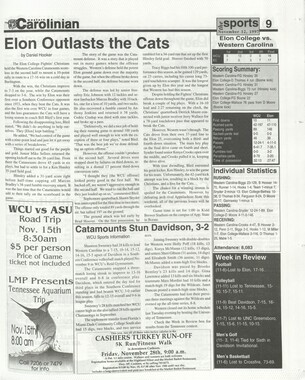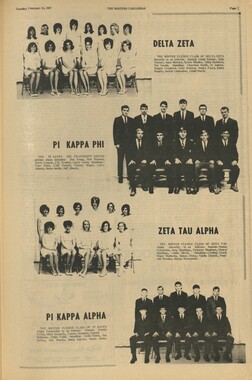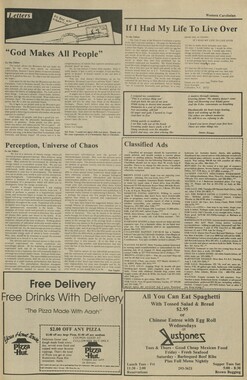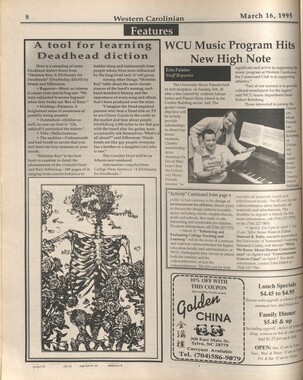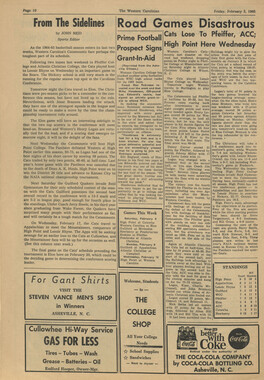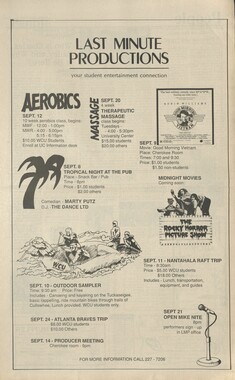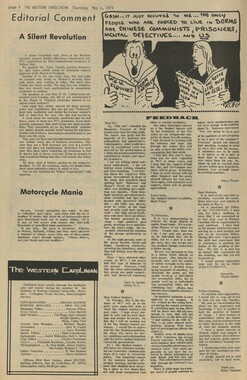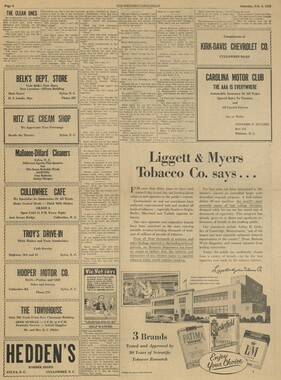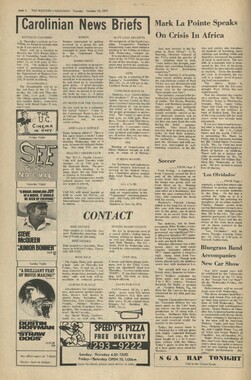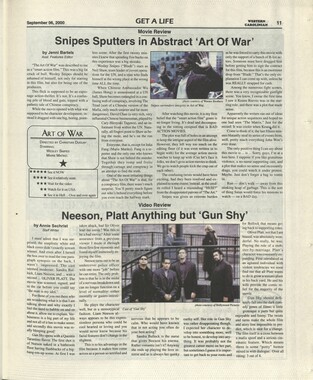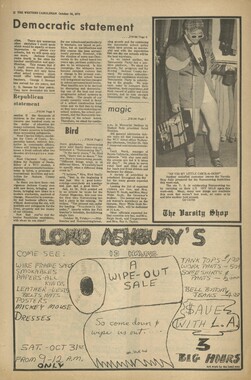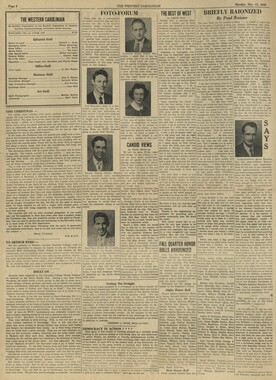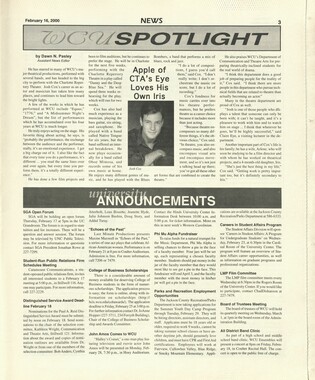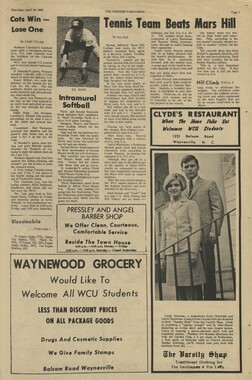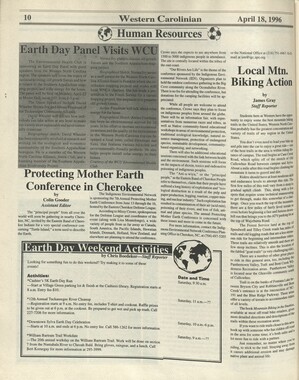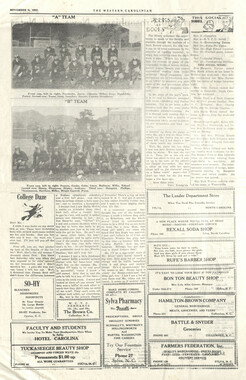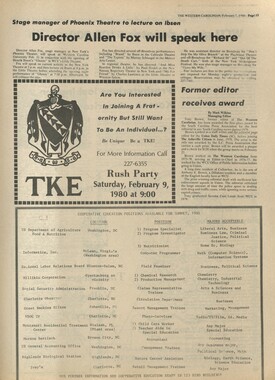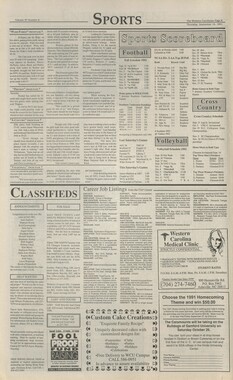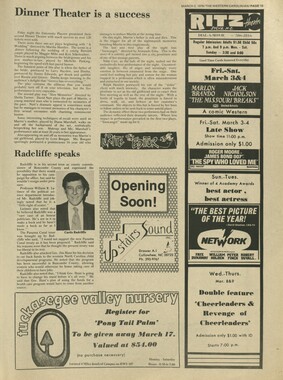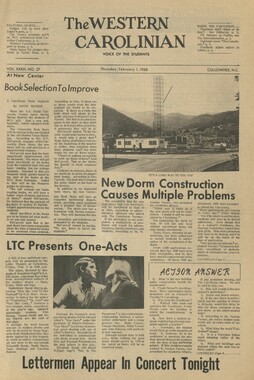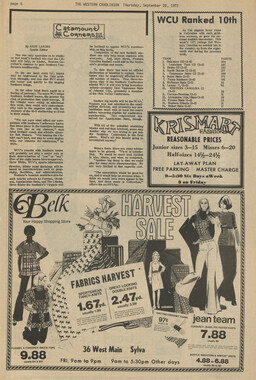Western Carolina University (20)
View all
- Canton Champion Fibre Company (2308)
- Cherokee Traditions (293)
- Civil War in Southern Appalachia (165)
- Craft Revival (1942)
- Great Smoky Mountains - A Park for America (2767)
- Highlights from Western Carolina University (430)
- Horace Kephart (941)
- Journeys Through Jackson (154)
- LGBTQIA+ Archive of Jackson County (26)
- Oral Histories of Western North Carolina (314)
- Picturing Appalachia (6772)
- Stories of Mountain Folk (413)
- Travel Western North Carolina (160)
- Western Carolina University Fine Art Museum Vitreograph Collection (129)
- Western Carolina University Herbarium (92)
- Western Carolina University: Making Memories (708)
- Western Carolina University Publications (2283)
- Western Carolina University Restricted Electronic Theses and Dissertations (146)
- Western North Carolina Regional Maps (71)
- World War II in Southern Appalachia (131)
University of North Carolina Asheville (6)
View all
- Western Carolina College (199)
- Western Carolina Teachers College (239)
- Western Carolina University (1792)
- Allanstand Cottage Industries (0)
- Appalachian National Park Association (0)
- Bennett, Kelly, 1890-1974 (0)
- Berry, Walter (0)
- Brasstown Carvers (0)
- Cain, Doreyl Ammons (0)
- Carver, George Washington, 1864?-1943 (0)
- Cathey, Joseph, 1803-1874 (0)
- Champion Fibre Company (0)
- Champion Paper and Fibre Company (0)
- Cherokee Indian Fair Association (0)
- Cherokee Language Program (0)
- Crittenden, Lorraine (0)
- Crowe, Amanda (0)
- Edmonston, Thomas Benton, 1842-1907 (0)
- Ensley, A. L. (Abraham Lincoln), 1865-1948 (0)
- Fromer, Irving Rhodes, 1913-1994 (0)
- George Butz (BFS 1907) (0)
- Goodrich, Frances Louisa (0)
- Grant, George Alexander, 1891-1964 (0)
- Heard, Marian Gladys (0)
- Kephart, Calvin, 1883-1969 (0)
- Kephart, Horace, 1862-1931 (0)
- Kephart, Laura, 1862-1954 (0)
- Laney, Gideon Thomas, 1889-1976 (0)
- Masa, George, 1881-1933 (0)
- McElhinney, William Julian, 1896-1953 (0)
- Niggli, Josephina, 1910-1983 (0)
- North Carolina Park Commission (0)
- Osborne, Kezia Stradley (0)
- Owens, Samuel Robert, 1918-1995 (0)
- Penland Weavers and Potters (0)
- Rhodes, Judy (0)
- Roberts, Vivienne (0)
- Roth, Albert, 1890-1974 (0)
- Schenck, Carl Alwin, 1868-1955 (0)
- Sherrill's Photography Studio (0)
- Smith, Edward Clark (0)
- Southern Highland Handicraft Guild (0)
- Southern Highlanders, Inc. (0)
- Stalcup, Jesse Bryson (0)
- Stearns, I. K. (0)
- Thompson, James Edward, 1880-1976 (0)
- United States. Indian Arts and Crafts Board (0)
- USFS (0)
- Vance, Zebulon Baird, 1830-1894 (0)
- Weaver, Zebulon, 1872-1948 (0)
- Western Carolina University. Mountain Heritage Center (0)
- Whitman, Walt, 1819-1892 (0)
- Wilburn, Hiram Coleman, 1880-1967 (0)
- Williams, Isadora (0)
- 1920s (57)
- 1930s (69)
- 1940s (114)
- 1950s (66)
- 1960s (314)
- 1970s (599)
- 1980s (406)
- 1990s (379)
- 2000s (195)
- 2010s (83)
- 1600s (0)
- 1700s (0)
- 1800s (0)
- 1810s (0)
- 1820s (0)
- 1830s (0)
- 1840s (0)
- 1850s (0)
- 1860s (0)
- 1870s (0)
- 1880s (0)
- 1890s (0)
- 1900s (0)
- 1910s (0)
- 2020s (0)
- Jackson County (N.C.) (2282)
- Appalachian Region, Southern (0)
- Asheville (N.C.) (0)
- Avery County (N.C.) (0)
- Blount County (Tenn.) (0)
- Buncombe County (N.C.) (0)
- Cherokee County (N.C.) (0)
- Clay County (N.C.) (0)
- Graham County (N.C.) (0)
- Great Smoky Mountains National Park (N.C. and Tenn.) (0)
- Haywood County (N.C.) (0)
- Henderson County (N.C.) (0)
- Knox County (Tenn.) (0)
- Knoxville (Tenn.) (0)
- Lake Santeetlah (N.C.) (0)
- Macon County (N.C.) (0)
- Madison County (N.C.) (0)
- McDowell County (N.C.) (0)
- Mitchell County (N.C.) (0)
- Polk County (N.C.) (0)
- Qualla Boundary (0)
- Rutherford County (N.C.) (0)
- Swain County (N.C.) (0)
- Transylvania County (N.C.) (0)
- Watauga County (N.C.) (0)
- Waynesville (N.C.) (0)
- Yancey County (N.C.) (0)
- Newsletters (510)
- Publications (documents) (1773)
- Aerial Photographs (0)
- Aerial Views (0)
- Albums (books) (0)
- Articles (0)
- Artifacts (object Genre) (0)
- Bibliographies (0)
- Biography (general Genre) (0)
- Cards (information Artifacts) (0)
- Clippings (information Artifacts) (0)
- Crafts (art Genres) (0)
- Depictions (visual Works) (0)
- Design Drawings (0)
- Drawings (visual Works) (0)
- Envelopes (0)
- Facsimiles (reproductions) (0)
- Fiction (general Genre) (0)
- Financial Records (0)
- Fliers (printed Matter) (0)
- Glass Plate Negatives (0)
- Guidebooks (0)
- Internegatives (0)
- Interviews (0)
- Land Surveys (0)
- Letters (correspondence) (0)
- Manuscripts (documents) (0)
- Maps (documents) (0)
- Memorandums (0)
- Minutes (administrative Records) (0)
- Negatives (photographs) (0)
- Newspapers (0)
- Occupation Currency (0)
- Paintings (visual Works) (0)
- Pen And Ink Drawings (0)
- Periodicals (0)
- Personal Narratives (0)
- Photographs (0)
- Plans (maps) (0)
- Poetry (0)
- Portraits (0)
- Postcards (0)
- Programs (documents) (0)
- Questionnaires (0)
- Scrapbooks (0)
- Sheet Music (0)
- Slides (photographs) (0)
- Songs (musical Compositions) (0)
- Sound Recordings (0)
- Specimens (0)
- Speeches (documents) (0)
- Text Messages (0)
- Tintypes (photographs) (0)
- Transcripts (0)
- Video Recordings (physical Artifacts) (0)
- Vitreographs (0)
- The Reporter, Western Carolina University (510)
- WCU Students Newspapers Collection (1744)
- A.L. Ensley Collection (0)
- Appalachian Industrial School Records (0)
- Appalachian National Park Association Records (0)
- Axley-Meroney Collection (0)
- Bayard Wootten Photograph Collection (0)
- Bethel Rural Community Organization Collection (0)
- Blumer Collection (0)
- C.W. Slagle Collection (0)
- Canton Area Historical Museum (0)
- Carlos C. Campbell Collection (0)
- Cataloochee History Project (0)
- Cherokee Studies Collection (0)
- Daisy Dame Photograph Album (0)
- Daniel Boone VI Collection (0)
- Doris Ulmann Photograph Collection (0)
- Elizabeth H. Lasley Collection (0)
- Elizabeth Woolworth Szold Fleharty Collection (0)
- Frank Fry Collection (0)
- George Masa Collection (0)
- Gideon Laney Collection (0)
- Hazel Scarborough Collection (0)
- Hiram C. Wilburn Papers (0)
- Historic Photographs Collection (0)
- Horace Kephart Collection (0)
- Humbard Collection (0)
- Hunter and Weaver Families Collection (0)
- I. D. Blumenthal Collection (0)
- Isadora Williams Collection (0)
- Jesse Bryson Stalcup Collection (0)
- Jim Thompson Collection (0)
- John B. Battle Collection (0)
- John C. Campbell Folk School Records (0)
- John Parris Collection (0)
- Judaculla Rock project (0)
- Kelly Bennett Collection (0)
- Love Family Papers (0)
- Major Wiley Parris Civil War Letters (0)
- Map Collection (0)
- McFee-Misemer Civil War Letters (0)
- Mountain Heritage Center Collection (0)
- Norburn - Robertson - Thomson Families Collection (0)
- Pauline Hood Collection (0)
- Pre-Guild Collection (0)
- Qualla Arts and Crafts Mutual Collection (0)
- R.A. Romanes Collection (0)
- Rosser H. Taylor Collection (0)
- Samuel Robert Owens Collection (0)
- Sara Madison Collection (0)
- Sherrill Studio Photo Collection (0)
- Smoky Mountains Hiking Club Collection (0)
- Stories of Mountain Folk - Radio Programs (0)
- Venoy and Elizabeth Reed Collection (0)
- WCU Gender and Sexuality Oral History Project (0)
- WCU Mountain Heritage Center Oral Histories (0)
- WCU Oral History Collection - Mountain People, Mountain Lives (0)
- Western North Carolina Tomorrow Black Oral History Project (0)
- William Williams Stringfield Collection (0)
- Zebulon Weaver Collection (0)
- College student newspapers and periodicals (1769)
- African Americans (0)
- Appalachian Trail (0)
- Artisans (0)
- Cherokee art (0)
- Cherokee artists -- North Carolina (0)
- Cherokee language (0)
- Cherokee pottery (0)
- Cherokee women (0)
- Church buildings (0)
- Civilian Conservation Corps (U.S.) (0)
- Dams (0)
- Dance (0)
- Education (0)
- Floods (0)
- Folk music (0)
- Forced removal, 1813-1903 (0)
- Forest conservation (0)
- Forests and forestry (0)
- Gender nonconformity (0)
- Great Smoky Mountains National Park (N.C. and Tenn.) (0)
- Hunting (0)
- Landscape photography (0)
- Logging (0)
- Maps (0)
- Mines and mineral resources (0)
- North Carolina -- Maps (0)
- Paper industry (0)
- Postcards (0)
- Pottery (0)
- Railroad trains (0)
- Rural electrification -- North Carolina, Western (0)
- School integration -- Southern States (0)
- Segregation -- North Carolina, Western (0)
- Slavery (0)
- Sports (0)
- Storytelling (0)
- Waterfalls -- Great Smoky Mountains (N.C. and Tenn.) (0)
- Weaving -- Appalachian Region, Southern (0)
- Wood-carving -- Appalachian Region, Southern (0)
- World War, 1939-1945 (0)
- Text (2283)
- MovingImage (0)
- Sound (0)
- StillImage (0)
Western Carolinian Volume 30 Number 13
Item
Item’s are ‘child’ level descriptions to ‘parent’ objects, (e.g. one page of a whole book).
-
-
Editorial Page The Sin Of Drink The current regulations concerning the use of alcoholic beverages by the undergraduates of Western Carolina College have caused a great deal of controversy among both students and faculty with an almost unanimous cry that these rules are too strict to be realistic. We have noticed friends and fellow students come and go—mostly go. We have seen young men and women expelled from the privilege of attending their institution because they transported alcohol, no matter how small the amount, through the portals of this college. Others left for having possession of alcohol off campus in private apartments. Whether a student smells of one beer or has consumed thirty the punishment is the same, suspension! The rule has extended to the point that one faculty wife taking undergraduate courses at Western withdrew in protest to the unfairness of this rule. A problem does exist: the problem of how to deal with these regulations. Many questions arise: How 'lo our drinking rules compare with those of other colleges and universities? What does the church feel about alcoholic consumption? How do our college administrations stand on these issues? In future editions of The Western Carolinian, we will attempt to answer these questions. We hope to present to you interviews with members of the clergy and members of the faculty and administration on the subject of drinking. When we have heard those opinions on the moral and social implications, perhaps we will have more ground on which to fight. No matter what, we surely will have a deeper understanding of the subject and how it affects the students. In a sense, we hope to present to you "The Western Carolinian's Philosophy." Perhaps we will be able to solve many problems, and maybe we will have some effect in getting these Victorian policies brought up to date. National Scene The Supreme Court By Bill Upchurch The Supreme Court of the United States is a powerful body whose decisions constantly limit and change the course of our daily life. It is the most powerful court in the nation. It has its power due to the fact it has the a- bility to establish precedent, which is the essence of our American legal system. In rulings from civil rights to prayer in our public schools, the Supreme Court has changed the laws of our land. It appears that the Supreme Court seems to be trying to change the Religious Philosophy of our nation. They seem to give their views, in the form of laws, on what they feel is right over what the majority seems to have expressed. The Supreme Court has ruled that prayer in our public schools is unconstitutional even if it is on a voluntary basis. The court could possibly turn its attention to banish other religious observances such as Christmas and Thanksgiving. Even though these are on a voluntary basis, they could be ruled unconstitutional. The recent Supreme Court decision regarding the violation of "civil rights laws" in South Carolina could have a No Greater Need Talk! Talk! Talk! But that is about all that has been done concerning a book store for Western Carolina. It is a shocking fact that a school the size of ours doesn't even have a shop where a student can browse among the dust-covered pages of great literature. We still need a book store. We still want a book store. We still do not have a book store. It is disgraceful that we must travel fifty miles or more in order to buy a copy of Candy. It would be much easier to bring Candy to Cullowhee. Some clever merchant could certainly make a profitable income. It would be like taking candy from a baby! THE WESTERN CAROLINIAN is published weekly by the students of Western Carolina College, Cullowhee, N. C. Represented for National Advertising by National Advertising Service, Inc. A member of the Intercollegiate Press Association and the Carolina Press Association. Offices are located on the second floor of Joyner Building. Telephone 293-2312. Subscription rate — $2.00 per year. BILL SHAWN SMITH FRED R. WRIGHT Editor Business Manager Managing Editor Jerry Chambers News Editors Nick Taylor, Betty Sprung Feature Editor Charles Stephens Sports Editor John Reid Copy Editor Joan Burnett Photographer Jack Stevenson, Jr. Cartoonist Mitchell Flinchum Columnists: Joan Burnette, Jerry Chambers, Thad Roberts, Bill Upchurch, Eddie Woodard, John Bruton. Writers: Kathy Abbott, Carolyn Allen, Mary Jane Carpenter, John Keeler, Burt King, Linda Krug, Cindy Borden, Joe Wray, Charlotte Wise, Marc Latour, David Walker, Danny Willard, Wanda Hall, Jim McAuliffe. Typists: Carolyn Allen, Rosemary Cameron, Rita Baliey, Becky Walker, Gloria Moody, Ann Ramsey, Carla Warner. Secretary Jane Souther Circulation Managers Hines Hunt, Ronnie Robbins Sponsor Henry G. Morgan At Random By Joan Burnett Now that it's nearly midterm and those people who are not taking a course in data processing have almost forgotten about registration and the "machine" (until the beginning of the new quarter, at least), it is perhaps safe to bring up the topic again — this time not in connection with Western Carolina College. If you think that Cullowhee is an unlikely place for a machine, then think of a place even more unlikely to be put at the mercy of the mechanized marvel. Take a wild guess! You're right, it is the Stonehenge. In a recent issue of ATLANTIC, Dr. Gerald S. Hawkins, Director of the Boston University Observatory, combined the science of astronomy and the Harvard-Smithsonian IBM 7090 to reveal what he called "The Secret of Stonehenge." We all know about Stonehenge from reading Tess of the Durbervilles and taking History 151, but with the help of "Oscar" as Dr. Hawkins calls the IBM Machine, it was discovered that now only was the Stonehenge a mortuary, a crematorium, and a temple, but also an astronomical observatory. This discovery was made with thirty hours of actual preparation and one minute of calculating on the part of the machine. "Oscar" was programmed to take the sum back ot 1500 B. C. in order to check the accuracy of the positions of the stones, stone holes, and mounds. A pattern related to the positions was figured out, which found that certain key positions paired with others in direct relationship to a sunrise, sunset, moonrise, and moonset. So it is, then, that Stonehenge was probably used to predict changes of the seasons, danger periods for eclipses of the sun and moon, and as an observatory of solar and lunar changes. The machine left other conclusions in the study to the science of archaeology. What was called "coincidence" by archaeologists — the fact that by standing in the exact middle of Stonehenge during the Summer Solstice (around June 22) on a clear morning, one can see the sun rise over the distant heelstone — has been proven to have definite bearing on the function and purpose of the ancient relic and is not coincidence at all. Plans and charts acquired in England and computation done in Cambridge, Massachusetts led to this discovery. Machines do more than just plot out registration material; They register the sun and moon and reclassify structures built four thousand years ago. It took thirty hours of plotting before "Oscar" could do one minute's work and solve the mystery of the Stonehenge, but it takes a great deal more plotting and a good deal more minutes than one to register some 2300 students. The machine that turned the sun back has updated Cullowhee. serious effect on future precedent decisions. As mentioned above, the Court's power lies In its power to establish precedent. In South Carolina those persons charged with trespass and other misdemeanors had violated South Carolina statute law. The cases referred to were being handled according to due process of law until the Supreme Court ruling dismissed the cases. The danger in this ruling is that the court stepped out of bounds insofar as all previous legal precedent is concerned. To have strictly followed legal precedent the violators released under this Amnesty Clause" should have stood trial. They could have, of course, plead "guilty" or "not guilty," as they desired. Should the plea have been "guilty" they would have been sentenced and, more than likely, a fine imposed on them. If a plea of "guilty" was entered and the case referred to the Superior Courts, the person could have requested a jury trial. Should he have been found guilty he could then have appealed to a higher court. This would have followed due process, and if the appeal went far enough, the Supreme Court could have e- ventually handed down a decision. I realize that such action would be costly and time-consuming, but we would at least be following established judicial procedure. The court has continually pushed for centralized government at the expense of individuals. The court is now putting less emphasis on the protection of individual liberties and more on making every American like other Americans through the use of centralized government. The court has ruled in such a way as to take the final sayso away from our elective bodies and to give it to their own elects. They have continued to advance into areas where the Congress and White House have been reluctant to give rulings. Are the words of our great fore-father, Thomas Jefferson, going to prove true, "The Supreme Court will e- ventually destroy this hard- won Constitution " Let's hope Mr. Jefferson was wrong.
Object
Object’s are ‘parent’ level descriptions to ‘children’ items, (e.g. a book with pages).
-
The Western Carolinian is Western Carolina University’s student-run newspaper. The paper was published as the Cullowhee Yodel from 1924 to 1931 before changing its name to The Western Carolinian in 1933.
-
